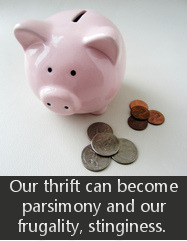Are Religious Parts of the US More Charitable?
Body
“Yes - there is clearly a positive relationship between religion and charitable giving. But it’s not a huge difference.” - Ryan Burge
As iron sharpens iron,
one person sharpens another. (Proverbs 27:17)
“Yes - there is clearly a positive relationship between religion and charitable giving. But it’s not a huge difference.” - Ryan Burge
“53 percent of [U.S.] adults strongly agree there is more to generosity than giving money. This number jumps to 80 percent when we factor in those who agree somewhat.” - Barna
Reposted from Rooted Thinking.
In Matthew 5:42, Jesus said, “Give to the one who asks of/begs from you.” This command of Jesus is not an easy one to apply. Christ’s words are straightforward: we must respond to those who, in their poverty, ask help from us.
“we do not need to be Christians for long before we learn that the greatest joy connected to wealth does not come from gaining but from giving. Hoarding wealth for ourselves gives far less lasting satisfaction than contributing wealth to God’s causes.” - Challies
Last Sunday, my son and I visited a nearby Orthodox Presbyterian Church. As a Baptist, I don’t quite fit in there, but then I don’t quite fit in at a lot of Baptist churches either!
I’d visited this church before, some years ago, but my son had never worshiped with Presbyterians. So for him it was an educational field trip, and for me it was a chance to catch up a bit with some friends and former students—and worship together.
“Legislating generosity is a way of shifting responsibility for compassion from me personally to everyone else around me. God intended for compassion to be relational not institutional.” - P&D
This article is an add-in to the series of posts on Tipping, Tithing, and Grace Giving. As I have continued to study what the Scriptures say about grace giving, I have seen an emphasis on generosity through both the Old and New Testaments. Grace giving is by definition generous.
This article is an add-in to the series of posts on Tipping, Tithing, and Grace Giving (Part 8). As I have continued to study what the Scriptures say about grace giving, I have seen an emphasis on generosity through both the Old and New Testaments. Grace giving is by definition generous.
I ordered an ice cream cone one time and watched as the server prepared it. She pushed the first scoop all the way to the bottom of the cone. She packed the second so it was even with the top. On this solid foundation, she constructed a towering ice cream edifice that looked like it would fall over any second, but held firm as she placed it in my hand. As I lapped at the overspill, I thought, “Wow, I got more than my money’s worth on this one.” The menu offered one scoop or two. She gave me way more. That’s the way to serve an ice cream cone! No hollow, soggy cone that caves in on empty space as you near the end. Delicious, creamy goodness from the first lick down to the last cold, crunchy bite.
“Roberts told the Times News that he came up with the idea for the website after hearing about the story of Alois Bell, a pastor who wrote on her receipt in lieu of a tip, ‘I give God ten percent, why do you get 18.’” HuffPost

If you’re not among the mommy set, you may not have heard about Hattie Garlick, the UK mom who has vowed not to spend a single pound on her two-year-old son for the next year. Hattie’s decision is part social rebellion, part necessity. She credits a growing distaste for “kiddy consumerism” and the fact that she was recently laid off (or as our British cousins say, “made redundant”). Ultimately, her decision is rooted in the ideas of minimalism and thrift—that we don’t need what everybody says we need and what we do need, we can find more cheaply.
I know a bit about this kind of counter-cultural lifestyle. I grew up in a family of seven with an extremely limited income. We gardened, canned, and wore hand-me-downs, not because my parents were making a public statement, but because they were trying to clothe and feed us. Even today with a smaller family and a decidedly larger income, I still buy most of our clothes at Goodwill, we hunt, garden, and can, and my idea of a good time is shopping at Aldi. And yet, even I am skeptical of frugality for frugality’s sake. (If I’m honest, I suppose I’m also a bit of a curmudgeon. Whenever being counter-cultural becomes trendy, I immediately get suspicious—I don’t make a very good hipster.)
Because even while those of us enmeshed in consumerism might need to cut of our hand to save our souls (Matt. 5:30), minimalism can have as many pitfalls as materialism. It’s entirely possible to trade consumerism for a Gnosticism that elevates efficiency and thrift above everything else. Just because we might be counter-cultural doesn’t mean that we don’t have our share of sub-cultural baggage. See if any of this luggage is yours:
Discussion